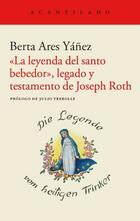Joseph Roth finished The Legend of the Holy Drinker two weeks before he died in Paris, drunk and stateless. Written between the fall of 1938 and the spring of 1939, his last nouvelle is considered the legacy and testament of his most intimate thought, but, as with the rest of his work, it has often been read exclusively within the Western canon, ignoring its undeniable inscription in the European Jewish tradition. In this illuminating essay, researcher Berta Ares Yáñez explores the topos, symbols, metaphors and literary motifs that characterize the work of Roth, prophet of modernity, in the light of the literature of the eastern shetl and Lurian mysticism, and thus reconciles it. with what Hannah Arendt called the "occult tradition" to refer to texts whose understanding cannot be referred to the canon with which Europe has explained itself.
All book titles by this author
|
Title |
Price | ||
|---|---|---|---|
|
|
«La leyenda del santo bebedor», legado y testamento de Joseph Roth Author: Berta Ares Yáñez Publisher: Acantilado |
$595.00
25%$446.25 |
Shopping cart
Loading cart
Important notices
|
|
Recordando a André Rouillé: Su legado en la fotografía André Rouillé 1948 - 2025 |
|
|
Libros de filosofía y co. Disponibles en Librería Herder |
|
|
Revista Filosofía & Co. nº 9 Nueva revista de filosofia divulgativa y actualidad |
|
|
"Espacios de la filosofía" - Mauricio Beuchot - Novedad Herder México |
|
|
Revista Filosofía & Co. nº 8 Nueva revista de filosofia divulgativa y actualidad |
Pay safely with:


In the webshop
New
|
|
Fragmento de una historia futura 70143 $340.00 -20.00% $272.00 |
|
|
Bullying 70382 $285.00 -0.00% $285.00 |
|
|
Dislexia 70381 $285.00 -0.00% $285.00 |
|
|
Autismo 70380 $285.00 -0.00% $285.00 |
|
|
Medios calientes 70159 $400.00 -0.00% $400.00 |
In the press
Promotions
|
|
El Gobierno de las emociones 65449 $965.00 -60.00% $386.00 |
|
|
Prosa y poesía. Homenaje a Gonzalo Sobeja 70242 $1,755.00 -25.00% $1,316.25 |
|
|
Lingüística española aplicada a la terapia del lenguaje 70239 $300.00 -25.00% $225.00 |
|
|
Introducción a la filosofía 70243 $620.00 -25.00% $465.00 |
|
|
El tratamiento de los niños autistas 70240 $675.00 -25.00% $506.25 |











